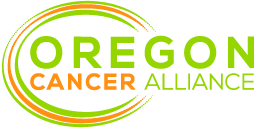Nurse practitioner Betty Goracke Olguin helps prepare patients at Willamette Valley Cancer Institute (WVCI) for a phase of their cancer experience called survivorship.
“We think of survivorship as the healing phase or the cancer rehabilitation phase of someone’s cancer journey. That’s typically after active cancer treatment and then moving forward,” she says.
Phases of survivorship
According to the American Society of Clinical Oncology, there are 3 phases of survivorship:
- Acute survivorship starts at diagnosis and goes through to the end of initial treatment. Cancer treatment is the focus.
- Extended survivorship starts at the end of initial treatment and goes through the months after. The effects of cancer and treatment are the focus.
- Permanent survivorship is when years have passed since cancer treatment ended. There is less of a chance that the cancer may come back. Long-term effects of cancer and treatment are the focus.
Betty creates an individualized survivorship care plan for each patient to help them prepare for life after active cancer treatment and to address unique needs and questions. That care plan includes:
- A personal record of a patient’s completed cancer treatment, including diagnosis, treatments, test results and medications.
- Future care plan details, such as recommended follow-up visits and testing, early detection screenings, and helpful resources for the treatment of side effects.
“Cancer survivorship looks different than it did 30 years ago,” Betty says. “People are living longer after their cancer diagnosis, so it kind of becomes a chronic illness that people have to learn to manage.”
The survivorship care plan also includes lifestyle changes patients can make to reduce the risk of their cancer coming back, such as exercise and diet.
“Some patients are still managing their side effects after treatment is done,” says WVCI registered dietitian Abby Traul. “So, we want to help the patient manage those side effects. But we can also help with diet to regain strength and energy, help with weight management, and improve a patient’s quality of life.”
Support resources
A patient will likely continue to see their oncology team for a period of time after treatment is finished. After that, the patient normally returns to their primary care physician for general care. During this time, many patients find it helpful to connect with other cancer survivors.
Oregon Cancer Foundation in Eugene offers free educational classes and support groups, as well as a seven-week Survivorship Series.
“We cover things ranging from emotional health, mindfulness, nutrition, sexual health—any aspect of a patient’s life that might have been impacted or might be impacted in the future by their cancer treatment,” says OCF Executive Director Amy Johnston.
Katie Burke is the foundation’s outreach coordinator. As a breast cancer survivor, she understands that new challenges can arise even years after treatment—and local support resources can help.
“Even 10 years out from my diagnosis, I was struggling with feeling like every ache and pain was a recurrence,” she says. “Being able to connect with other survivors was helpful. It’s also important to be reminded that once you’re a cancer survivor, you’re always a cancer survivor, and it’s normal to have those feelings.”
The Oregon Cancer Foundation’s next Survivorship Series begins April 13th and meets once a week through May 25th. It’s free to attend but registration is required. For more information, click here.
